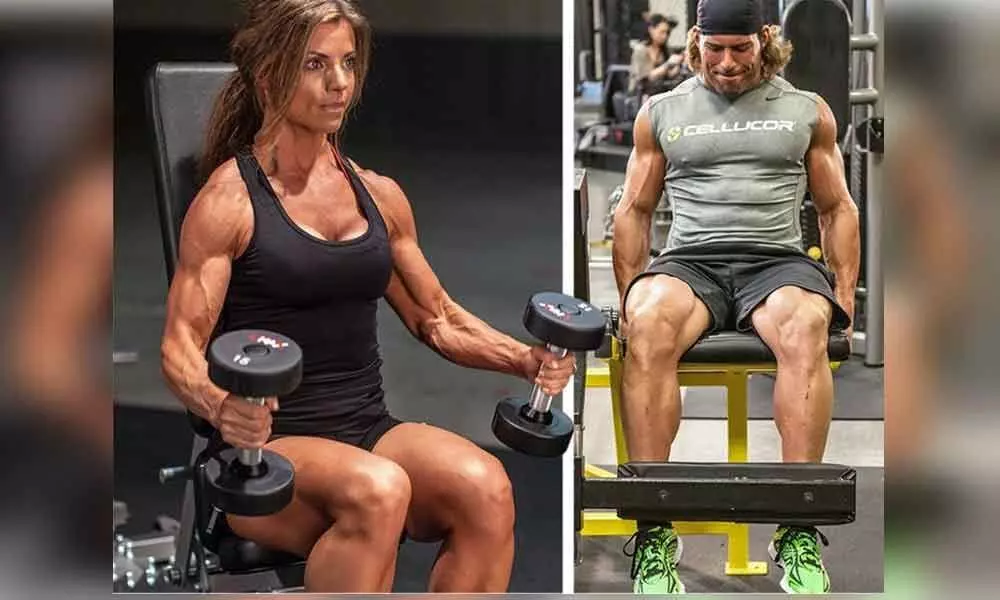Facts about Keto Bodybuilding - Keto diet It's Possible, but it's not easy Check this out

A common belief among bodybuilders is that carbohydrates are essential for building the best physiques.
A common belief among bodybuilders is that carbohydrates are essential for building the best physiques. However, carbohydrates have little to do with the success of many bodybuilders. The key to improving body composition is not through little intricacies like eating the right amount of carbs at the right times. The best bodies are built by implementing five simple principles, whether you are on the ketogenic diet or not.
There's a common misconception in the bodybuilding space that you need carbohydrates to build muscle. So does this mean you can't successfully build muscle on the ketogenic diet? After all, the ketogenic diet requires you to keep carbs to a minimum. It turns out, the high-carb paradigm is outdated. In fact, the ketogenic diet can help increase strength and build muscle while minimizing fat gain.
A new wave of bodybuilders are now using the low-carb, high-fat lifestyle to build muscle without carbohydrates
In this article, we'll talk about:
The Common Misconception: You Need Carbs to Build MuscleThe traditional bodybuilding nutrition protocol assumed that carbohydrates were required to build muscle. It's still common to hear bodybuilders talk about needing glycogen from carbs to spike insulin and create an anabolic response, which helps you build muscle. The truth is, bodybuilding on a low-carb diet is completely viable when done correctly. Studies have shown that following a strength training regimen along with a ketogenic diet can increase lean muscle mass without excess weight gain.
But it doesn't happen overnight. Quite the opposite, in fact. Because you have to switch from using glucose (carbs) as fuel to using fat as fuel. This is called the "keto-adaptation" phase and it takes time. About one to four weeks when your workouts can suffer from a decrease in performance.Why Your Strength May Suffer During Keto-AdaptationWhen you are in the beginning phase of the ketogenic diet, you may not be able to exercise with the same intensity you did with carbs.
This is because your body is switching from breaking down glucose for energy (glycolysis) to breaking down fat into ketones. To successfully build muscle on the ketogenic diet, you have to follow the diet long-term. Since your body is used to burning glucose (from carbohydrates) as its main source of energy your entire life, it needs time to adjust. When you restrict carbohydrates, it has to find another source of energy. This is when ketones are introduced as your body's main energy source.
The longer you stay on keto, the more efficient your metabolism becomes at burning ketones for energy and the better your workouts become. So by training your body to run off ketones from fat, it improves your mitochondrial density. This allows you to train faster and longer. In other words, once you become fully keto-adapted, your body synthesizes more energy, also known as adenosine triphosphate (ATP), from both your stored body fat and dietary fat to fuel your workouts. Studies have also shown that the low-carb, high-fat ketogenic diet has muscle-sparing effects.
That means — once you're fully fat-adapted— your body will prevent itself from breaking down muscle even as you're burning through fat. You Need to Eat More Protein (And Not Be Afraid of Gluconeogenesis)One of the biggest concerns with building muscle on the ketogenic diet is that high protein consumption will kick you out of ketosis. There is a process called gluconeogenesis where your body turns excess protein into glucose in your bloodstream.
And it's true that the presence of glucose will stop you from producing ketones. But what many people forget to take into account is that your body and brain need glucose to survive. Even when you're on a ketogenic diet, you want some glucose to feed specialized cells (particularly brain cells) that can only run on glucose.
You even make glucose out of fat — fatty acids have a glycerol backbone that you convert into glucose[*]. So why do we do keto if we need glucose? While we may need glucose to live, we don't need near as much as the population consumes. Currently, people are over-indulging on carbohydrates which are causing insulin resistance and hindering your body from burning stored body fat for energy.
This leads to unwarranted fat gain, chronic high blood sugar, insulin resistance, and systemic inflammation. When ketogenic dieting, you are providing your body with just enough glucose (from fats and proteins) it needs to survive. Running off ketones gives you a more efficient energy source and allows you to build muscle through protein synthesis without worrying about gaining excess body fat.
How Much Protein Should You Consume? Protein intake eat differs depending on your activity level. Here are the general guidelines for protein consumption on the ketogenic diet Sedentary: .8g of protein per pound of lean body mass (total weight – body fat % * .8)Not much exercise: 1g of protein per kg body weight moderate exercise: 1.3 g / protein per kg body weight heavy exercise: 1.6g of protein per kg bodyweight it's common for people on the ketogenic diet to consume less than is needed to build muscle. Probably because the keto diet increases satiety. In other words, you don't eat as much when you're simply not hungry. Want to gain more muscle on keto? Get more calories. Eat More Calories to Gain More MuscleTracking your calories is the fastest way to reach your muscle-building or weight loss goals. For muscle growth on keto: Consume 150 – 500 extra calories above your normal maintenance calories Consume around 1 gram of protein per pound of lean body mass at a minimum The rest of your calories should come from healthy fatsBuilding muscle is a matter of consuming more calories than your body burns daily. Eating at a caloric surplus in addition to adequate protein levels will help you achieve the muscular physique you've been working towards. Use this handy keto macro calculator to help you find out how much of each macronutrient you should be eating to build muscle based on your own individual metrics.
The Targeted Ketogenic Diet Approach for Bodybuilders A targeted ketogenic diet (TKD) encourages up to 20-50g of carbohydrates immediately before or after your training session. And yes, that's your entire carb allotment for the day. This allows your body to use that quick glucose to amplify your workouts.
When done properly, your body burns through those carbs quickly and you'll pop right back into ketosis. A TKD approach works for people who have already followed the ketogenic diet for at least a month. And it usually works better for people who perform really hardcore workouts.
But in general, the amount of carbs you'll consume is based on the intensity of your workout. Here's an estimate of how many carbs you should consume based on activity: People who do high-intensity training like Crossfit can consume 50g of carbs a day competitive athletes can consume up to 100g of carbs a Dayan average person who exercises four to five times a week can get by with fewer than 20g of carbs a day if you are just a beginner with the ketogenic diet and your main goal is weight loss, don't try the TKD approach. Instead, you should consider following a standard ketogenic diet meal plan while focusing on other performance-enhancing factors, like eating enough protein. Pay Close Attention to Your Electrolyte ConsumptionMaintaining proper electrolyte levels are imperative for optimal athletic performance.
The main electrolytes you should always monitor include sodium, potassium, and magnesium. These are the top three electrolytes you're likely to lose through sweat and urine. It's crucial to refuel your body with keto-friendly, nutrient-dense foods to ensure your body is performing at its best during your workouts. Ketogenic-friendly, magnesium-rich foods include:
Ketogenic-friendly, potassium-rich foods include:
You can also supplement with Keto Electrolytes if you are prone to electrolyte deficiencies or you just want a quick and easy option. Sodium Intake Must Increase on the Ketogenic diet one of the biggest mistakes people make when restricting carbohydrates is a lack of sodium intake. When you restrict carbs, your body excretes more electrolytes than usual.
Especially during the first few weeks of keto-adaptation and especially sodium[*].If you're bonking at the gym while on the keto diet, try, increasing your sodium intake, especially before your workouts. Sodium is required for healthy muscles, nerve activity, and helps regulate muscle contraction, nerve function, and blood volume. Both the ketogenic diet and exercise contribute to the loss of water and electrolytes. If you're not consuming enough, you may fall into the dreaded keto flu. The minimum you should consume is 5,000mg to 7,000mg of sodium daily.
Before your training, make sure to take 1,000mg to 2,000mg to improve performance. Sodium consumption doesn't increase depending on your weight loss or muscle building goals. Instead, focus on increasing sodium if you are sweating more frequently or if you have just started the ketogenic diet. Tip: Adding sodium to your water in the morning or before your workout can drastically help with your training.
If you feel that you are getting tired fast in the gym, you'll find that including more salt will help you last longer during your workouts and need less rest between sets. What Type of Sodium Should You Use? Where you get your salt doesn't matter as much as the amount you're consuming. The best course of action is to use a mixture of Himalayan sea salt Mortons lite salt this mixture will give you enough sodium to fuel your workouts along with potassium from Mortons lite salt to help you hydrate. How to Properly Fuel Your WorkoutsAside from maintaining balanced electrolytes, some people may still feel a slight decrease in performance after restricting carbohydrates, especially athletes. If your workouts are suffering and you need an extra boost, here's a great ketone-boosting pre-workout shake: 20-30g of high-quality whey isolate or beef protein 5-15g of Keto Collagen 1-2g of sodium 5g of creatine, if needed Pour into coffee and blend Consume 20-30 minutes before training there's why this drink works: The amino acids in protein help build muscle The MCT oil powder gives you an immediate energy source from fats The sodium will help you last longer during your workouts Creatine increases short-term strength[*] Both the fats and protein will raise insulin just enough to put your body in an anabolic state (muscle building)Sugar-Free Electrolyte Drink Many keto diet bodybuilders like to sip on an electrolyte drink throughout the day. This should be sugar-free and include sodium, potassium, and magnesium. Be careful not to consume any drinks that are high in sugar such as Gatorade as it will kick you out of ketosis. Tips For Building Muscle On Keto
You've learned plenty in this ultimate guide to building muscle on keto. How can you put it all together? Get leaner, stronger, and healthier? Here are some actionable tips:#1 Reduce CarbsRecall that carbs don't matter for building muscle. In fact, they seem to hinder it. Here's what you do. Load up the Perfect Keto Calculator, input your diet, and take note of your daily carb intake. If more than 15-20% of your calories are carbs, you're probably not in ketosis. You're probably not helping your muscles either. Not to worry. Just swap out carbs for healthy fats (like MCT oil and nut butter) and healthy proteins (like grass-fed whey protein). Then recalculate your ratios and smile.#2 Eat Enough ProteinIt's possible to go keto, yet still, be short on protein. Without plenty of leucine in your blood, you can't synthesize muscle like a champ. Fortunately, it's easy to dial up your protein intake: Eat more meat, fish, and eggs. Include grass-fed whey protein powder or collagen protein powder in your smoothie If you're vegan, and can't eat high-quality whey protein, consider hemp or pea protein.
Choose high protein, keto-friendly snacks like Perfect Keto bars and of course, crunch those numbers to ensure you're eating enough protein every day. #3 Strength TrainNetFlix marathons, however blissful, won't advance your muscle-building goals. Nope. You have to put in the work. But it needn't feel like work. Resistance exercise — a proven mood-booster — can be tons of fun.
Here are some fun muscle building workouts: Heavy, compound lifts like pull-ups, squats, bench press, and deadlifts Yoga or pilates Bodyweight exercises like push-ups, planks, and bodyweight squats Rowing Sprinting — increases anabolic hormones like testosterone The list goes on — so pick one or two, and get stronger.# 4 Supplement CreatineRemember glycogen? It's your storage form of glucose, stored mostly in muscle cells. Low carb keto diets, however, don't exactly optimize for glycogen in serious athletes. In fact: if you're constantly depleting your muscle glycogen with hard workouts, you might want to step up your supplement game. Enter creatine. Creatine helps you synthesize and maintain glycogen stores — and probably should be taken by any keto-adapted athlete. In addition to glycogen enhancement, creatine — a safe and natural compound — also helps: Build strength and muscle Prevent age-related muscle loss[*] Increase explosive power. Boost cognitive performance How should you take creatine? Your best bet is creatine monohydrate — the cheapest, most-researched, and most widely-available form of this supplement. One example is Perfect Keto Perform — which contains, in addition to creatine monohydrate, several other performance-boosting compounds. Happy supplementing.What Not to Do When Bodybuilding on the Ketogenic DietThere are several misconceptions that people fall prey to when exercising on the low-carb, high-fat lifestyle. The Cyclical Ketogenic DietOne common belief is that loading up on carbs once or twice a week is required when you're first starting out.
This is also known as the Cyclical Ketogenic Diet (CKD). While CKD may help you gain muscle, it's better to experiment with it once you're more experienced on the keto diet. When you're new to the ketogenic diet, following a CKD approach will be counterproductive. If you're a beginner to keto, your body is still used to burning carbohydrates as its main energy source. By carb-loading every week, you'll slow down your progress. Your body needs time to adjust to using ketones efficiently. It can take up to a week or more before your body gets used to burning fats as energy. This is what happens when you eat carbs every weekend when you're not fat-adapted: On average, it'll take two to three days to get into ketosis after you cut carbs out
Once Saturday comes around and you carb load, you're no longer in ketosis then, your body has to reset the cycle of depleting the carbs from the liver to start generating ketonesThis cycle in conjunction with the ketogenic transition phase means you'll only be in a state of ketosis for one to two days out of the week. Someone who is new to keto should be on the low-carb, high-fat diet for at least a month before considering a CKD.
After a month, most people can even get by with carb backloading every 15 days to once a month rather than every week. It's also common for people to take the wrong approach when following a CKD. One of the main reasons why people adopt a cyclical ketogenic diet is because they assume they can eat whatever they want — from pizza to Oreos — without worrying about ruining their diet. This is a common misconception. A proper carb load for bodybuilding requires very low fat consumption and high carb intake for one to two days of the week. Junk food like pizza is high in fat and carbohydrates. A CKD isn't a free pass to eating whatever you want! It's not the tastiest diet and requires a lot more discipline having to eat meals like chicken breast and rice for the whole day.
Instead, you should start out on a standard ketogenic diet. Ketosis has muscle-sparing benefits, but only if you're keto-adapted[*]. When you're first starting out, you may lose a small amount of lean mass. This is because your body wants glucose since it doesn't know how to use ketones for fuel yet, so it takes some glucose from amino acids via your muscles. When you start out with a CKD, you'll constantly take small amounts of amino acids from your muscles and you'll teeter in and out of ketosis so you never fully become keto-adapted. Avoid CKD, carb backloading, and junk food — at least for the first month or so of keto.
Constant Cheat Days
Having a cheat meal every once in a while is perfectly acceptable. Most of us like to use cheat days to take a break and binge on junk food so you can come back into the diet rejuvenated. But many people make the mistake of overindulging on unhealthy food when they have a cheat day. Just because you had a piece of chocolate cake does not mean you should eat the whole thing. Instead, allow yourself to have a cheat meal here and there depending on how far you are from your goals. For example, if you have 100lbs to lose, the more cheat meals you have, the longer it'll take to reach your weight loss goal. Conversely, if you are already close to your desired weight and you're on the ketogenic diet to feel good and maintain stable energy systems, you can get by with more frequent cheat meals. Fasted TrainingThere's a common misconception that training in a fasted state will help you burn more fat.
This is a misunderstanding and can be counterproductive toward your fat loss goals. Your body needs energy and doesn't burn fat exclusively. When you train fasted, you may lose fat but you may also burn lean body muscle mass.
If you're doing crazy intense workouts, animal protein like beef protein along with MCT Oil Powder will provide you with more energy for a better workout to help burn fat without losing any muscle. You may lose weight training fasted but may also lose lean body mass in the long term. Focus On Ketones OnlyJust because you're producing ketones doesn't mean you're losing weight. Overeating will hurt your training efforts and physical goals like fat loss and muscle gain. Instead of focusing on ketone production, you should prioritize lean tissue growth.
Invest in building lean mass with adequate protein and fat, but keep your eyes on your caloric intake and your overall body composition, not just the level of ketones in your blood. The goal is to lose body fat and improve body composition as a whole, not just bodyweight overall. Why Making Ketones is Not Always the Same as Using KetonesPeople often confuse having high ketone levels with being in a fat-burning mode. This isn't always true, especially as a beginner. Some factors that contribute to ketone production include Dietary fat intake amount of body fat you have a frequency of exercise having higher ketone levels doesn't mean you're losing fat. Ketones are a source of energy and when you first start, it's normal to have higher ketone levels. This is because your body isn't fully adapted to using ketones for energy yet so ketones stay circulating in your blood or get excreted rather than used as fuel. If you're consuming enough nutrient-dense calories and you already have low body fat, your ketone production is going to be on the lower end. There is no build-up of ketones because your body is actually using it as its main source of energy. The longer you stay on the ketogenic diet, the more effective your body becomes in using ketones as energy. It's common for more experienced keto dieters to see lower levels of ketones through ketone strips. This shouldn't discourage you whatsoever because your body is using ketones for energy more efficiently (instead of peeing it out). It's normal to be in the .6 – .8 mmol range of ketones once you are fully keto-adapted.Note: If your goal is to lose weight and you still have a high body fat percentage, you should focus more on staying low carb rather than eating large amounts of fat. This shift allows your body to use its own fat stores for energy, which leads to increased fat loss. Bodybuilding on the Ketogenic Diet Will Help You Build Muscle While Minimizing Fat gain the majority of the bodybuilding industry praises the low-fat, high-carbohydrate protocol for gaining muscle. Mostly because that's been the status quo for so long. But more recent science supports the idea that you don't need carbohydrates to build muscle.
Following the strategies above will ensure that you minimize the time it takes for your body to become keto-adapted. Bodybuilding on the ketogenic diet will allow you to build muscle while keeping fat to a minimum. As long as you are carefully monitoring your electrolyte levels, measuring your body composition instead of ketones, and eating adequate amounts of protein, you will begin to see vast improvements in your overall physique.

















